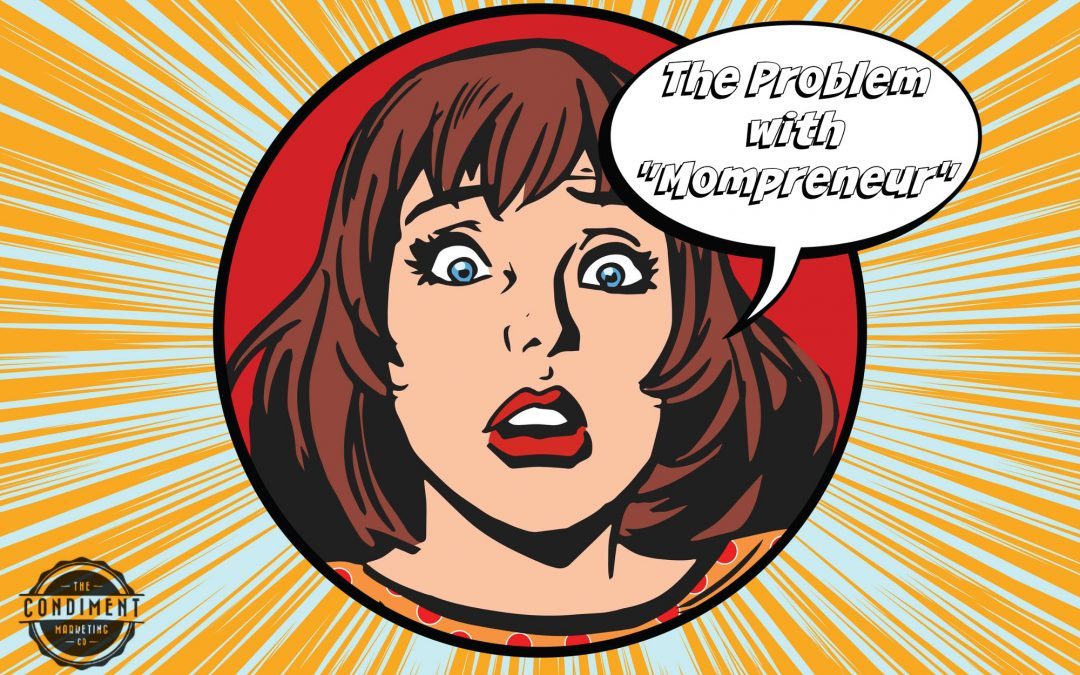I am a woman, a mom, and the former owner of a small, specialty food business. Many of my friends are business owners in the artisan, craft food community in Denver. A lot of them are women, and some of them are also moms.
A few months ago, I read an article about a “Mompreneur.” It featured an empty-nester mom who was bored, started a pickle business and became very successful. The article seemed to be there just to say, “Hey, a mom started a business and it’s doing well!”–details about the woman outside of her mom-ness were left out. It was so similar to every other story I’ve read about female-owned businesses, and yet so far removed from any I’d ever known in real life.
I don’t know anyone who claims to be a Mompreneur, but I do know women in the specialty food industry who feel the effects of this one-dimensional perception of moms who own businesses.
What is a Mompreneur?
Mompreneur is defined on businessdictionary.com as “a multi-tasking mother who can balance both the stresses of running a home-based business as an entrepreneur, and the time-consuming duties of motherhood at the same time.” In the food industry, it’s typically used in reference to women who own a specialty food business (cookies, cupcakes, and pickles, for example).
The Mompreneur Narrative in the Press
The typical entrepreneurial success story in the press describes the business owner’s prior education and professional experience, the moment of entrepreneurial inspiration, obstacles overcome, mergers, and business partners picked up along the way. Rarely is the entrepreneur’s marital or parental status mentioned. It’s a business-focused story that gives an accurate picture of how a serious business owner achieved success.
The typical mompreneur success story in the press might describe how a woman followed her passion and used her baking hobby, free time, and world-famous cupcake recipe to start a business that quickly became a huge success. It often tells how the husband supported the business, and how the kids are involved in the business now that it’s successful.
It’s a romanticized, glossed-over, human interest story about a woman who stumbled into success. It rarely gives an accurate picture of how hard she likely worked to get there. Journalists tell this same story over and over, swapping out different women as the subject of the story.
Press that highlights female-owned businesses is positive for all female business owners, but not when the stories are told from this perspective.
The Problem with “Mompreneur”
Some female business owners might feel perfectly comfortable with the Mompreneur moniker. Embracing it makes it easier to get press for their business. It might make it easier to network with other business owners. It might also help them connect with their target market.
But a woman running her own business in addition to caring for her young children is nothing new in the year 2016. According to the SBA, women-owned businesses account for 28.7 percent of all businesses nationwide. So it begs the question, is it necessary to include the word mom at all? After all, a man who runs his own business in addition to caring for his young children isn’t a “Dadpreneur”–he’s an entrepreneur.
Inserting the word “mom” into her job title implies that the business isn’t her first priority. It implies that her business is a hobby business, or a side job that brings in a little extra income for the family. It allows the press to continue giving lightweight accounts of women’s businesses and it gives the general public the perception that her business is lesser than one of a “real” entrepreneur.
For female specialty food business owners, it’s not uncommon for well-intentioned customers and strangers to say things like
“You do the jam and your husband does the business side of things?”
or
“Good for you for getting out there and doing what you love!”
or
“What a fun way to make a little extra money!”
or “Who’s watching your kids?”
and (every working woman loves this one)
“How do you balance it all?”
They are not common conversations for male food business owners. They are not the kinds of conversations any professional wants to have.
Change the Conversation
I wonder what the empty-nester mom who makes pickles thought of her mom-focused article. I imagine it was very exciting to get some press, but I also imagine that there’s much more to her story than the fact that she had kids, they grew up, she got bored, made pickles, and then became a success.
I don’t really want to hear about a female business owner’s husband or the age of her kids. I’d like to hear about how she managed to get to the point where she could hire employees. What knowledge or previous education does she have that contributes to her success? What were her most difficult growing pains and how did she move past them? Does she still get her hands dirty in the kitchen, or has she been able to transition into another role? Tell us about all the times she considered throwing in the towel and the things that kept her in it. Tell us about her plans for growing her business. Tell us something that has nothing to do with the fact that she got married and gave birth.
 Then maybe my hard-working, deliberate, dedicated, intelligent, and multifaceted friends (even the ones who’ve had a baby or three), can get down to business and start answering some of those questions as well.
Then maybe my hard-working, deliberate, dedicated, intelligent, and multifaceted friends (even the ones who’ve had a baby or three), can get down to business and start answering some of those questions as well.
This post is written by Julie Ciezadlo, a copywriter and social media manager at The Condiment Marketing Co.






Thank you for this post! I’m a few months into a new business selling sauerkraut, and this article sums up many people’s attitudes towards it (including my husband’s, unfortunately. He even calls it “your little [business name)-ey. Ugh.) Someday, people will see it as a legitimate business, because I will not be taken lightly.
I appreciate your perspective and your helpful blog. Thank you.